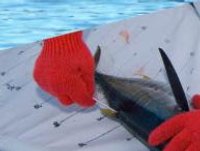Symposium on Tuna Tagging in the Indian Ocean

The European Commission is participating as a major benefactor in the Indian Ocean Tuna Tagging Symposium, 30 October – 2 November 2012, in Grand Baie, Mauritius. The EU supported the research project, the Indian Ocean Tuna Tagging Programme (IOTTP), through the European Development Fund and between 2002 - 2009 more than 200,000 tuna were tagged and released in various areas of the Indian Ocean. The aim of this project was to know more about the status and population dynamics of the main stocks of tropical tunas in the Indian Ocean.
This symposium will focus on the evaluation of the IOTTP so far. Today more than 31,500 tags have already been recovered in this project, giving new insights into the spatial and migratory movements along with population dynamics and the biology of tropical tuna species such as Yellowfin. The latest results of this research will hopefully allow a debate on the relationship between science and management which should lead to improvements in long-term sustainability, which is at the core of the reform of Common Fisheries Policy.
Commissioner Damanaki welcomed the symposium:
"Dear participants,
I think we can all agree that one of the major challenges we are facing today is the health of seas, oceans and marine resources. But the world also needs healthy seafood as well as growth and jobs in coastal areas. So, while the world needs to preserve genetic biodiversity, we also need to ensure the industry’s viability and protect those who make their living from fishing."
The only solution to these conflicting interests is a new approach to fisheries management. One that strikes a balance between the need to protect fishing communities and the need to keep fish stock at sustainable levels.
Research and science are essential to such an approach. Knowledge is the key to sound decisions and to effective management measures: the more we know about a species of fish, the more our decisions will be spot on and beneficial to it.
This symposium marks an important step in this direction.
Between 2002 and 2007, over 200 000 Tropical Tunas were tagged. Over 30000 were recovered in the context of the Indian Ocean Tuna Tagging Programme. The information gathered through these tags gives us remarkable insights into the population dynamics of this valuable species – insights that the project’s scientists are now going to share with you and with fisheries managers, scientists, industry and civil society around the world.
This new knowledge will be useful to the whole marine scientific community. I am particularly proud of this result, because the programme was largely funded by the European Development Fund. I have no doubt that it will help us achieve our common goal to preserve tropical tunas through sound management decisions and sustainable fishing practices.
As the EU market for fisheries products is, in value, the largest in the world, it is our responsibility to ensure that fish is sustainably and legally harvested. We are currently changing our own fisheries policy to make it more sustainable, and we plan to apply the same principles also outside EU waters.
But to do so, we need the help of our partners in Regional Fisheries Management Organisations. This programme and its success wouldn’t have been possible without such cooperation. I would therefore like to thank all those who have contributed to this initiative: scientists, fisheries managers, fishermen and others. I’m sure this will remain a milestone in the work of the Indian Ocean Tuna Commission for some time.
Let's hope that similar projects will follow, with equally promising results.
I wish you all a fruitful Symposium and look forward to its results.


